 Fancy goats-- Angoras-- are raised on Peavine Hollow Farm.
Fancy goats-- Angoras-- are raised on Peavine Hollow Farm.
PHOTO BY WILL WALKER
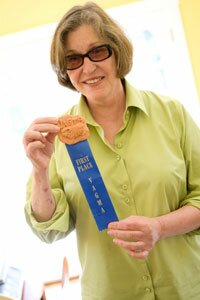
Kristina Lawwill has won awards for her goats, and she plans to increase her herd and mohair production now that she's retired from teaching.
PHOTO BY WILL WALKER

Peavine Hollow Farm produces between 500 and 600 pounds of mohair a year.
PHOTO BY WILL WALKER
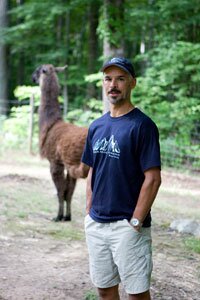
James Dubovsky has appealed to police and the Board of Supervisors about barking dogs in his neighborhood.
PHOTO BY WILL WALKER
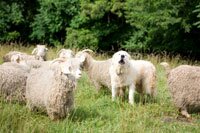
Don't even think about jumping into this Maremma-guarded pasture to snatch an Angora sheep.
PHOTO BY WILL WALKER
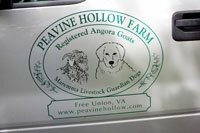
Kristina Lawwill says she's a goat farmer, not a kennel, but she does sell some of her Maremmas to recoup the cost of importing them from Italy.
PHOTO BY WILL WALKER
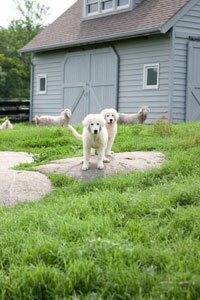
It takes about two years for a Maremma sheepdog to become a trustworthy guardian. These pups still are apprehensive of strangers.
PHOTO BY WILL WALKER
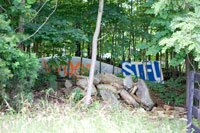
The sign on Dubovsky's property facing the Lawwills expresses his frustration.
PHOTO BY WILL WALKER
Peavine Hollow Road is quintessential 21st-century Albemarle. Although unpaved, the Free Union-area road is home to exotic animal farms, a pick-your-own berry patch, and generous lots that seem tailored to boutique farms and providing plenty of breathing room between neighbors. Lately, however, the bucolic setting has become the eye of a storm over dog barking, something the county tried to remedy last year by banning unneighborly canine noise, an ordinance that ran afoul of the state's highest court and may get rewritten and tightened in the coming days.
In the outlying parts of the county, some already decry any barking restriction as an assault on property rights and an attack on the Albemarle's vaunted rural character. Others, however, hail the ordinance for offering protection of their property rights, such as quiet enjoyment of-- you guessed it-- the county's rural character.
And some simply wonder why a dispute over the sounds emanating from man's best friend should escalate to cops and courtrooms.
The neighbors
The first thing Kristina Lawwill shows a reporter visiting her farm-- named Peavine Hollow, just like the road-- are pictures of her chewed-up Angora goats. Lawwill, who retired in June from teaching science at Jack Jouett Middle School, and her husband, Larry, the former principal of Albemarle High, say they still haven't quite recovered from the trauma of finding an entire herd of 20 dead or maimed goats after a pack of three neighborhood dogs went on a rampage while they were out of town one weekend in 1992.
After the attack, she researched ways to protect the herd and learned that a time-honored solution was a breed called the Maremma Sheepdog, bred in Italy to guard livestock from wolves and other canines. Unfortunately, for the cause of peace along Peavine Hollow Road, Maremmas bark, and Lawwill currently has five adults and two pups.
"If I don't have dogs, I can't have herds," declares Lawwill.
Her neighbor is James Dubovsky, and he sees things differently.
The first thing he shows a reporter is a video he says he shot earlier in the day from the porch: it's Lawwill's Maremmas barking. After at least 10 minutes of video with all-too-clear audio, his wife, a teacher who asked not be be named in this article, asks him to shut off the incessant sounds.
"Some people think if they own land, they can do what they want," complains Dubovsky. "We suffer sleep deprivation."
Dubovsky, who works for Albemarle County in information technology, knows what it's like to raise exotic animals, and to lose one. Shortly after they moved in next door to the Lawwills in 1997, the family began raising llamas. A bear killed one. Today, they have two llamas on their 24-acre parcel.
Dubovsky had hoped the current barking ordinance would give him relief, but it exempts landowners like the Lawwills with more than five acres from compliance. "So I have to listen to my neighbor's dog bark?" he asks incredulously.
Legal framework
Before Albemarle's Board of Supervisors passed the bark ban a year ago in a 4-2 vote, there was little recourse outside of civil law for those who lived beside dogs that would just not shut up. The county advised talking to one's neighbor-- try that when their pets have kept you up all night-- and even printed up a little brochure with some advice. One Albemarle police officer drew controversy by suggesting that bark-averse citizens offer to buy an offending neighbor's dog an anti-barking collar.
Last June, the hearing that preceded the ordinance unleashed a firestorm of sentiment on both sides of the bark. The Board ultimately passed a law that forbade 30 minutes of barking with no more than five minutes of quiet. Since it passed, two citations have been written, and one case ended up in court, where the judge recommended mediation.
And now it's back.
"I was the swing vote that put the present ordinance in effect only on the condition we have a public hearing after a year to see how it's working," says Supervisor Sally Thomas. "That's quite a public promise."
Her vow has resulted in a July 8 hearing to weigh expanding the ordinance from five acres to include barking on any sized parcel. The entire animal section of county code is getting rewritten to fall in line with state legislation, largely spurred by the 2007 arrest and subsequent conviction of Michael Vick for a dogfighting operation called "Bad Newz Kennels" based at his 15-acre property in Surry County.
While Thomas calls much of the state-mandate "quite intrusive," one draft change simply alters the language to substitute "audible" for the current language that bars barking that "unreasonably disturbs the peace and quiet, comfort, or repose of any person in the county."
"I've heard from people who fear what's audible to their neighbor, that if you hear my dogs at all, you can take me to court," says Thomas.
Whether "audible" will enter local law remains to be seen, but the current language describing "unreasonably" loud noise is unconstitutional, says Commonwealth's Attorney Denise Lunsford, and her office has recently told magistrates not to issue warrants for barking violations.
Albemarle's law was made unenforceable by Tanner v. City of Virginia Beach, an April 17 ruling by the Supreme Court of Virginia. Calling it constitutionally vague, the Court struck down Virginia Beach's noise ordinance, which prohibited "unreasonably loud" noises.
"What's unreasonable?" asks Lunsford. "What's excessive? It's hard to enforce when a similar ordinance has been declared unconstitutional."
In the City of Charlottesville, the law merely requires that barking that "shall cause annoyance and disturb the peace and quiet of any person or neighborhood" is unlawful. So far this year, one citation for annoying barking has been written; in 2008, none were.
Silent and unsilent protest
"When we built our farm, no one was around," says Kristina Lawwill, remarking on the 40-acre property she and her husband bought in 1986.
"I'm from New York City," says Lawwill. "My husband wanted to be a gentleman farmer. He's the gentleman, and I'm the farmer."
Tubs of orange, purple, and green mohair sit in a workroom above her garage. She picked Angora goats because they were small enough for her and her daughters to handle, and she describes the wool enterprise as a family affair. And now that she's retired from teaching, she'd like to expand her herd from its present count of 52 head.
"We produce 500 to 600 pounds a year," says Lawwill. "We're looking to double that."
After the goat massacre of '92, Lawwill says she called all over the country to find a Maremma. Six pastures are surrounded by four-board fencing with electrical wiring to further discourage incursions from roaming dogs, and--- now that they've arrived in Albemarle--- coyotes.
Maremmas bark when they perceive a threat. Whether it's a predator hoping to munch down on a kid or someone jogging down Peavine Hollow Road, that's one of the ways they protect their herds, explains Lawwill.
Maremmas are hard to find. Although the Lawwills have imported four Maremmas from Italy, they bought their first pair in America in 1992.
"We haven't had any losses since," she says.
Lawwill used to teach the daughter of the Dubovskys and recalls when their daughters were friends. And, ironically, Lawwill says, she was the one who told the Dubovskys when the land next door came up for sale. In 1997, when the Dubovskys finally moved in, after about a year spent building their house, Lawwill had three Maremmas.
"Two dogs are not bad," says Dubovsky about the noise level, although in the late '90s at a neighborhood association meeting, there were complaints that the Maremmas barked at women making their morning walk down the road to get their newspapers.
Lawwill says that meeting was held at her house and that Dubovsky "very forcefully" complained about the noise. She added a pasture closer to the house, and says things seemed to quiet down for a few years.
In 2000-2001, Lawwill says, she imported three more Maremmas, and that seems to have been the tipping point for the Dubovskys.
"It got worse and worse," says Dubovsky. "They'd go away for the weekend, and they'd bark and bark. No one goes out there to calm them-- it's dark and they'd hear noises-- and see if anything's wrong, if a goat's head is stuck in the fence."
The Lawwill's Peavine Hollow Farm website advertises Angora goats, mohair, and Maremmas. And Dubovsky contends Lawwill is running a kennel, something forbidden without a special use permit. In 2004, she was reported for running an unpermitted kennel.
"I'm not a kennel," she insists. "I'm a farmer.
"My primary income," she says, "is from Angora goats. The county looked at my registration and sales, and [the citation] was abated," says Lawwill, who says she sells at most two dog litters a year, typically presold.
Dubovsky, who denies instigating the investigation, contends that Lawwill keeps the dogs 1,000 feet from her own house, where she won't hear them, and in a field beside his property line that's just 200 feet from his house.
"I can't move my house," says Dubovsky, who says the barking typically begins around 10:30 at night and continues to 2 or 3am. "You don't need six dogs to guard 30 sheep," he argues. "They have created this situation."
Dubovsky says he's not against dogs, and that another teacher on the street who owns goats responds immediately to silence her dogs when they bark.
"This is not someone with one dog that barks occasionally," he says. "This is someone who installed six who bark." That they continue to bark, says Dubovsky, is "negligence."
"I don't like barking, and I don't like to be awakened at night," counters Lawwill. "I don't think I could have lived here 17 years if they did."
Lawwill says she's been keeping a log, and has not been awakened by the Maremmas, but has heard coyotes around 2am. But she agrees with Dubovsky on at least one topic: "If they're barking consistently, something's wrong.
Lawwill suggests that Dubovsky contributes to the barking, such as when he fires a gun. Or when, in retaliation, he's played amplified recordings of barking so loud that a contractor at her house once called the police because he allegedly believed an animal was in distress.
"I shoot black powder to scare away what's scaring the dogs," explains Dubovsky.
As for the recordings, "This is the noise they're generating," says Dubovsky, who concedes that police have told him to cease the practice.
Dubovsky has installed a sign at the property line facing the Lawwills' pastures and the Maremmas: "STFU."
Huh? "Shut the...," explains Lawwill of the sign that's part of her view.
"I see that as a silent protest," says Dubovsky.
Working dogs
"It's absolutely crazy and sad," says Maggie Ayers, who rents a cottage on Lawwill's farm of the dispute. "I've never been woken up. I've never been bothered."
The only time she hears the dogs bark, she says, is when she runs. What disturbs her more, she says, have been the times Dubovsky fired a gun.
"When I first moved in, it was daily," says the nine-month tenant, who says she hasn't heard gunfire recently.
Many residents of Peavine Hollow Road are reluctant to weigh in on the canine contretemps, and most contacted by a reporter declined to be quoted for this article.
"It is something that somewhat divides people in the neighborhood," says relative newcomer Leah Sweeney. "I don't know what the ideal answer is when two neighbors see things so differently."
Still, Sweeney doesn't support expanding the barking ordinance to include the rural area. "I would feel differently if I was in a neighborhood beside a dog," she says.
"Some nights they do bark a lot," says Sweeney. "My husband has been kept awake. I sleep through it."
The Sweeneys are dog owners and try to be understanding about barking because they chose to live in an area where goats are raised. "I do think if they bark all night long consistently-- which these don't-- if they bark incessantly, you should go out and see what's going on."
On the other hand, the Dubovskys moved in after the Lawwills.
"That's hard for me," she says.
Across the county off Stony Point Road, Michele Mangham uses Maremmas to guard her flock of 400 sheep and 80 Angora goats on 152 acres. She has a 10-year-old dog that sleeps a lot, and two two-year-olds, one of which she's considering selling because "they play too much."
Maremmas are nocturnal, she says, sleeping most of the day. They chase skunks, fox, and deer from the fields, where she occasionally finds a dead fox. Mangham got her first guardian dog after discovering coyotes on their farm 15 years ago. She says she's had no complaints about barking, and when her dogs do bark, she goes out to check.
Mangham questions the severity of the predator problem in Free Union, and accuses Lawwill, who sells Maremma pups for $800 each, of running a kennel.
"You only need one dog to guard 30 goats," Mangham says. "She's got six out there, and they feed on each other. She's really blown it for us farmers who aren't a puppy mill."
During Angora breeding season, Lawwill responds, she needs a dog in each of her six pastures and doesn't allow them to roam between pastures.
"We do that because the number one cause of livestock guardian dog death is being hit by a car," says Lawwill. "The second is being shot by a neighbor."
Most of Lawwill's 40 acres are forested, and Mangham thinks something's "innately wrong" that so many dogs are needed to watch sheep on the seven pasture acres-- roughly one dog for every eight goats, by Mangham's count.
"How ineffective those dogs must be if she needs six," says Mangham, suggesting other livestock guardian options.
"I'm disappointed Kristina never tried donkeys or llamas." And why she wouldn't, Mangham has a hunch. "Because they're not profitable," opines Mangham.
"There's a history there," Lawwill replies to Mangham's remarks.
Mangham believes that one transgressor has created the whole push to extend the barking ordinance into the rural area.
"I think it injures us real farmers with our real shepherd dogs," she says.
Real kennels
Not too far from Peavine Hollow on Wesley Chapel Road is the Farmington Hunt Club. Do kennels filled with baying foxhounds get complaints from neighbors? "Not really," says Patrick Butterfield, Farmington's master of foxhounds, "because we were there first."
Farmington also kennels beagles closer to town at Foxfield, the sprawling point-to-point race course on Garth Road, which has Butterfield as its director. Technically a rural area, Garth has been sprouting giant houses in well-heeled subdivisions for a couple of decades with little complaint about barking, except from a new neighbor on Garth Gate Lane.
"A woman moved in and was startled to see all these hounds," says Butterfield. "This individual was very upset. I said, 'It's only 200 yards away. You didn't notice?'"
As a realtor, Butterfield says, he would feel obligated to inform a client if there's a kennel in the neighborhood, because "you don't move in and complain."
To Butterfield, a barking ordinance in the rural area doesn't make sense. "The term 'rural' means country," he says. "To make a law about barking means it's not rural."
Does country mean quiet?
White Hall District Supervisor Ann Mallek is a real farmer who lives in the real country-- and she firmly favors extending the barking ordinance to the rural areas, especially after a visit to Peavine Hollow Road. Mallek, a science teacher for the Virginia Natural History Museum, took a class to the Dubovskys' llamas and didn't love what she saw and heard next door.
"The entire time we were there, the dogs were barking at the property line," observed Mallek. "[The Dubovskys] had nowhere to get away."
Lawwill points out that a class visiting the Dubovsky llamas, which are fenced in near the Lawwill property line, would naturally draw the attention of her dogs, and they were doing their jobs by barking at the potential threat.
"I have a very short fuse for this because I don't let my own dogs bark," says Mallek.
"We're spending time and staff effort to legislate something that should be taken care of by their owners," says Mallek, who calls excessive barking "a sign of neglect."
Along with Ken Boyd, Supervisor Lindsay Dorrier voted against the ordinance last year and sees this as a property rights issue and a conflict between suburban and rural points of view. "When you move out to the country," says Dorrier, "you expect to let the dogs run free." Still, he urges pet owner responsibility.
A lawyer, Dorrier offers this advice to country folk plagued by nonstop barking: "You can get a warrant for disturbing the peace."
As for his upcoming vote, says Dorrier, "I'm going to wait until the public hearing to make up my mind."
Supervisor Dennis Rooker, another lawyer and dog owner, is not certain that the dog ordinance that's worked well for the urban ring-- at least until it became unconstitutional in April-- will work well in the country.
While Rooker isn't sure the proposed expansion will pass, he scoffs at one of the key allegations against the law. "I don't think requiring people to reasonably control their dogs is an attack on the rural character," he says. "It should be common courtesy."
Dog people
The Charlottesville Albemarle Society for the Prevention of Cruelty to Animals is usually quick to weigh in on issues such as dogfighting (bad), cat shooting (bad), and euthanasia (avoid if possible). At press time, however, the SPCA has no official position on dog barking in the rural areas because, according to executive director Suzanne Kogut, its members fall on both sides of the issue. Even Kogut is conflicted.
"It's a tough one," says Kogut. "At the end of the day, you want to make sure it's not a neighbor dispute."
Speaking personally and, she stresses, not for the SPCA, she says, "I'm against legislation."
She's concerned about dogs barking 30 minutes or longer because that can be a sign something's wrong-- but she acknowledges that sometimes the problem may exist primarily in the mind of one or both of the neighbors.
Jim Barrett of the Charlottesville Albemarle Kennel Club points out that since the ordinance was enacted last year, only one case has been heard in court. And the judge sent it to mediation.
"Judge [William] Barkley said this is exactly the sort of law that doesn't make sense," recounts Barrett. "It puts one person against another. It's not a great law to begin with, and to expand it to the rural area is to make it worse."
In particular, he points to the use of the term "audible" in the draft ordinance.
"We think there should be a dog mediation group: dog owners, trainers, people who don't have dogs and don't want to hear them-- the whole gamut," offers Barrett. "We should try to do these sorts of things instead of court."
Cheryl Falkenburry is an animal behaviorist at Center Hills School in Fluvanna who worked with the dogs in Albemarle's only barking case that went to court.
"If a dog is barking for 30 minutes, something is wrong," she says.
The problem in the rural area is that people have working dogs, she says. "They're doing what they're supposed to do." Dogs like Maremmas are very aware of their surroundings, says Falkenburry, and she believes it's unlikely a working dog will bark 30 minutes.
"I'm kind of like, you move to the country, you have country noises," she says.
Poster girl
Carol Minetree is the only person charged under the current law. It was a complaint brought by an Earlysville Forest neighbor about allegedly incessant yapping from her SPCA-adopted dogs, Scooter and Emmy.
"Expanding it makes a bad ordinance worse," says Minetree. She ended up in mediation with her neighbor, Peter Sweeney, who did not return the Hook's calls, and she worked with animal behaviorist Falkenburry to quiet her pooches.
She and her attorney, Melissa Wolf Riley, think mediation should have been the first step, not the last.
"It's easy to get a summons and get to court without proving it," says Riley, "but once you get in court it's hard to prove. As an attorney, I'm going to say, did you sit there with a stopwatch?"
Riley also fears it could be used for harassment, as a dog owner could conceivably be cleared twice and still hauled back into court on a new summons.
"A lot of times when you focus on something, that's all you hear," says Riley. "It could be when you hear a dog barking, it feels like a half hour."
For James Dubovsky, he insists the issue is not about Lawwill, but about the county not having an ordinance to protect his property rights. He compares the barking to a car alarm going off.
"Who lets a car alarm go off for 30 minutes?" he asks. "It's about management of your dogs. And why is a dog barking two hours rural character?"
Lawwill does not see a property rights issue. "This particular one is a neighborhood issue," she says. For 10 years, she hasn't publicly responded to Dubovsky's allegations, but she plans to attend the public hearing July 8 because an expanded ordinance "would be the nail in the coffin for goats."
Supervisor Sally Thomas remembers advice she was given from former board member Gerald Fisher when she was first elected to the Board of Supervisors: "Don't get involved with anything that has to do with dogs."
"People feel very strongly about dogs," she explains.
And then there's the whole perception of country living. Some people come to the rural area to let their dogs run free, others for peace and quiet. "It's a real clash," Thomas observes. "It used to be handled person to person."
The Board of Supervisors will hold a public hearing on changes to the animal ordinance at 6pm Wednesday, July 8, in Lane Auditorium in the Albemarle County Office Building.
#